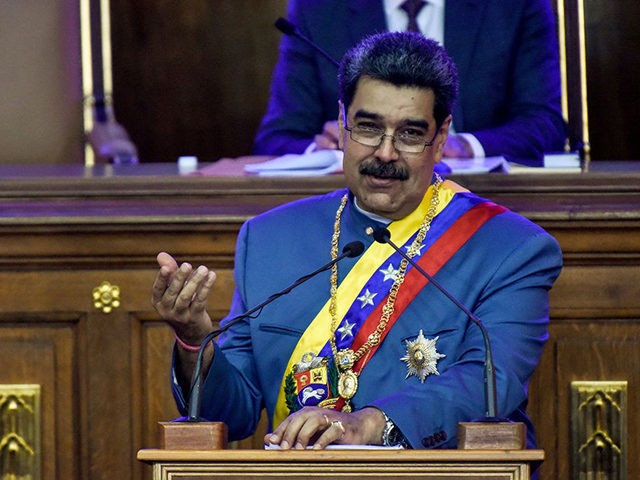Venezuelan socialist dictator Nicolás Maduro revealed via Twitter on Wednesday that he had concluded an “excellent videoconference” that day with United Nations High Commissioner for Human Rights Michelle Bachelet, who previously accused him of “grave human rights abuses.”
Maduro’s regime enjoys a seat on the U.N. Human Rights Council and Maduro himself addressed the Council last month, using the opportunity largely to promote dubious coronavirus “cures” and complain about sanctions against his regime imposed by the United States. The U.N. Council and independent investigators working for the global institution — and Bachelet’s office itself — has for years affirmed that an extensive body of credible evidence exists that Maduro ordered the Venezuelan military to engage in gross human rights violations for years, particularly the use of rape, torture, and extrajudicial killing to silence anti-socialist dissidents.
“Essential institutions and the rule of law in Venezuela have been eroded,” Bachelet, formerly the socialist president of Chile, wrote in a 2019 report following a working visit to Venezuela. “Many could constitute extrajudicial killings, and should be fully investigated with accountability of perpetrators, and guarantees of non-recurrence.”
Despite personally testifying to Maduro’s role in human rights atrocities in the country, photos published by Maduro showing Bachelet on his computer appear to indicate that she engaged the dictator in a friendly chat on Wednesday. Bachelet appears to smile warmly at Maduro and the other senior regime officials on the call.
“I had an excellent videoconference with the High Commissioner of the U.N. for [human rights], [Michelle Bachelet],” Maduro wrote. “We discussed the negative effects of sanctions against Venezuela, we also expanded upon material elements of our policy regarding the Covid-19 [Chinese coronavirus] pandemic.”
Sostuve una excelente videoconferencia con la Alta Comisionada de la ONU para los DDHH, @mbachelet. Conversamos sobre los efectos negativos de las sanciones contra Venezuela, también ampliamos elementos en materia de nuestra política de atención a la Pandemia del Covid-19. pic.twitter.com/3EiegswS2E
— Nicolás Maduro (@NicolasMaduro) March 3, 2021
The Venezuelan Foreign Ministry issued an expanded statement noting that Maduro was accompanied in his discussion by the regime’s top diplomat, Jorge Arreaza, and providing some more detail on the conversation. The two sides reportedly discussed “advances obtained through cooperation and the work in strengthening mechanisms for the protection of human rights in the country.” Like Maduro’s short statement, the Ministry emphasized that the main point of discussion for the regime was the fight against sanctions placed on it “unilaterally,” meaning by the United States, and claims that the sanctions themselves are a human rights violation.
Most American sanctions on the Maduro regime relate to its extensive record of violating the human rights of Venezuelan citizens. The sanctions target the state oil company, Petróleos de Venezuela (PDVSA) as well as personal assets belonging to Maduro and some of his top officials. Maduro has not been legally president of Venezuela since January 2019, when his last legal term expired, so American authorities have also prohibited his regime from accessing government funds, giving that option to the legitimate president of the country, Juan Guaidó. Despite his status as the constitutional president of Venezuela, Guaidó has failed to exercise his powers in any meaningful way as Maduro retains control of the nation’s military.
The U.N. recognizes Maduro, not Guaidó, as the head of state of Venezuela.
Multiple U.N. reports have found Maduro guilty of extreme human rights abuses. A special mission to the country published a report in September accusing Maduro of “the systematic use of torture” against political dissidents.
“The Mission found reasonable grounds to believe that Venezuelan authorities and security forces have since 2014 planned and executed serious human rights violations, some of which — including arbitrary killings and the systematic use of torture — amount to crimes against humanity,” chief investigator Marta Valinas said at the time. “Far from being isolated acts, these crimes were coordinated and committed pursuant to State policies, with the knowledge or direct support of commanding officers and senior government officials.”
Prior to the 2020 report, Bachelet herself visited Venezuela on a mission to assess the human rights situation there, finding evidence of “grave human rights violations” committed on Maduro’s orders.
“During my visit to Venezuela, I was able to hear first-hand the accounts of victims of State violence and their demands for justice,” Bachelet said in a statement. “I have faithfully conveyed their voices, and those of civil society, as well as the human rights violations documented in this report, to the relevant authorities.”
Among the human rights violations Maduro has ordered his officers to commit are extensive executions of children, the systematic rape of political dissidents, attacks on churches, and rampant use of torture in political prisons.
These violations did not stop the U.N. Human Rights Council from welcoming Maduro alongside other grave human rights violators like China, Cuba, and Pakistan, as a member government. Maduro told the Human Rights Council last month that he would no longer accept any more investigations into his nation’s dire human rights situation.
“I reiterate that the Venezuelan state will decidedly work with the actors of this Human Rights Council, just as I ratify that we will not accept the intervention of any inquisitor mechanism against our nation, Venezuela, that seeks to use the just cause of human rights as a political tool for a government, or a regime, change in our country,” Maduro said.

COMMENTS
Please let us know if you're having issues with commenting.